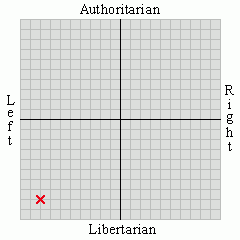Christopher C. says:
“Man A spends 1 hour to build 1 iPod."
"Man B spends 1 hour to build 5 iPods using his iPod-making machine that fell out of the sky."
"The average value of the iPod is 20 labor minutes (6 iPods / 2 hours = 20 minites/iPod)."
"But in 1 hour of labor, man A produced 1 iPod, man B produced 5 iPods."
"Man A sells his iPod for 20 labor minutes of some other good. Man B sells his iPods for a total of 100 labor minutes of some other good."
"Ergo, Man A's labor value is 20 minutes per hour. Man B's labor value is 100 minutes per hour."
"Ultimately, under this theory, either time is relative at zero acceleration or the theory is false. I'm inclined to believe in the laws of physics over the fickle fantasies of man.”
From what I can tell, the labor theory of value does not say that those who put in more time than others to produce the exact same product should receive more compensation for the work they have done. I don't believe in the notion that there is an objective "just price" depending on the cost of production and from what I know about the labor theory of value, it doesn't seem to require one either. A society doesn't prosper by increasing the labor value of a given output, but by increasing the use-values that can be produced by the labor force. Decreasing the labor values of commodities increases the use-value or utility. It makes life easier by providing the luxuries and necessities of life with less consumption of individual time and energy. Clearly person B's time is more valuable than person A's because more is accomplished and more value created. Person B clearly has better skill, knowledge, and/or technology, which means his or her current labor value is also factoring in past labor (embodied in say the iPod-making machine, time spent getting an education, etc.), which allows him or her to be more productive than person B. Because person B is not using his or her time efficiently, most likely he or she will shift his or her time and energy to do something else as a result of interacting economic pressures. Ultimately, relative prices tend towards relative labor values. So we should realize that the labor theory of value says that the price of a commodity is something other than its value. The relative prices of most reproducible goods and services are proportional to the amount of present and past labor time required to obtain, manufacture, process, distribute, and transport them. So the labor theory of value is restricted to the analysis of reproducible commodities that have a use value in a capitalist society and states that market prices are attracted by prices proportional to the labor time embodied in commodities.
So the labor theory of value is really referring to some abstracted labor value equilibrium point that would hypothetically be reached through the forces of supply and demand if everything else were kept constant. It would need to be a situation of perfect competition. Of course these economic pressures do not remain constant and therefore the equilibrium point itself if constantly shifting. However, with a free market in labor as well as capital (absent the money, land, tariff, patent/copyright monopolies created by state-government) supply and demand would constantly push the prices of goods and services towards that shifting equilibrium point that represents labor time. Here we have the idea that cost would approach or become the limit of price in a genuine free market absent state-government intervention. Naturally, the cost of production and thus the price will always fluctuate due to the different interacting economic forces at a particular time and place. The main thing to remember is that the labor theory of value is concerned with looking at a stretch of time to find the average labor value (measured in hours or person-years) necessary to produce a commodity. It is saying that if supply and demand equilibrate each other, the market prices of commodities will correspond with their natural prices, that is to say, with their values as determined by the respective quantities of labor required for their production.
I think that labor values can be seen as playing a role in the widely accepted conception of economic scarcity. Scarcity obviously plays a big role in price because being scarce by definition means that on average it requires more labor to acquire or produce. You might be walking down a road and come across a nugget of gold, but on average it requires more labor to find due to its scarcity and thus commands a higher price. Water is very important for survival, but it is so cheap when it is readily available, meaning it requires less labor to acquire or produce. When scarcity goes down due to something like new technology, less labor is required to acquire or produce the commodity, so the price goes down. I don't see the labor theory of value necessarily rejecting the subjective valuations of supply and demand.
Even if we disregard the labor theory of value, I believe we can still come to the same mutualist conclusions. So lets say we fully reject the labor theory of value and accept the subjective theory of value. Most of us would agree that remuneration for work done should be based on actual labor contributed to the production process. You should be giving something up by sacrificing your time and energy to produce value and then you should get something back in return. You should receive compensation based on your skills and knowledge, which means you should only be receiving compensation based on the value placed on what you produce with your own labor. Compensation should be based on the subjective value you are actually creating. You shouldn't be receiving benefits from the value of someone else's labor.
Thus comes the idea that you should be receiving the full fruits of your labor. If you are being compensated for something other than your applied mental and/or physical labor, then you are a lazy leech sucking the blood out of productive society. Even state capitalists would have you believe that this is what they are supporting. I claim to be ultimately against all handouts and so do the capitalists. But now we can look out into society and see if we can spot the leeches. Who if anyone is receiving compensation based on something other than their productive labor?
Here we should look at the sources of bargaining power in society. So we look at the two main forces: capital and labor. It should be plain to see that those who privately own the means of production/survival have the upper hand when it comes to bargaining power in society. So what does this ultimately mean? It means capitalists are able to command much more than labor. So the capitalists do not compete on the basis of individual productive labor, but instead compete on the basis of private control over the land and resources for which access is necessary for individuals to provide for themselves. Money is made from simply owning money. This is primitive accumulation. Most of us probably don't think that Paris Hilton has earned her fortune or that a corporate executive making millions of dollars is actually contributing more valuable labor than all of the other workers combined. According to a post on the Question Everything blog:
"In the US the richest 1% of the population (the capitalist class) owns more wealth than the bottom 95% of the population combined. It is physically impossible for that one percent to work harder then the other ninety-five percent. There simply aren't enough hours in the day. The average American worker works around 50 hours a week; for the capitalists to work ninety-five times more then the average worker he would have to work 4,250 hours a week. There are only 168 hours in a week; it's not possible for this wealth disparity to be the result of capitalists working harder."Now we can see that one can reject the labor theory of value and propose unequal bargaining position rationales for the exploitation theory.
So the mutualist solution is to create an economic system that produces a self-sustaining information feedback loop that produces prices that reflect productive mental and physical labor subjectively valued in a free market. We believe that this would have the opportunity to develop in the absence of state-government intervention. We aren't calling for any kind of state-government redistribution program (that is what got us here in the first place), but are instead trying to free up the market and create competition among capital. So instead of having state-government protected privileges conferring private control over access to the means of production/survival skewing prices and bargaining power in favor of those who don't labor to produce value, productive labor would have more bargaining power. With labor now hiring capital instead of the other way around, the increase in competition would allow economic pressures to compensate individuals on the basis of productive labor (factoring in skill, knowledge, effectiveness, efficiency, etc.). So to the extent possible you would now have more of a merit based system. The mutualist free market in credit would increase competition between lenders, which would make interest-free loans available and enable workers to buy their own means of production rather than having to sell their labor to a capitalist in order to survive. Therefore, usury in the form of interest, rent, and profit would be greatly reduced or disappear. It would result in a form of free market socialism where workers' cooperatives and self-employed individuals freely exchange goods and services.
If you don't want people getting a "free lunch" or "free ride" like a bunch of "fucking hippies", then your primary target should be the capitalists and the state-government officials that maintain their privileges while themselves simultaneously benefiting off of these artificial privileges through taxes, political favors, etc. Mutualists aren't for a return to dirt farming and we aren't even for ridding the world of all force and coercion. That is obviously impossible. We still support self-defense and the directing of human behavior that inevitably comes from the pressures inherent in social interaction. We support free association and disassociation. We can still consider those to be applications of force and a type of coercion. From that understanding, mutualists only oppose certain forms of force or coercion that come with a certain type of authority. We oppose the irrational authority that comes from a formal institutionalized hierarchical seat of power, while supporting the rational authority that comes with mental and physical prowess or expertise. Rational authority emerges spontaneously from individuals willingly following a leader instead of having a ruler force them to "follow" and obey. When we look at our representative "democracy" most of us can readily see the irrational outcomes that stem from its bureaucratic hierarchical power. So monopoly is a mutualist's ultimate enemy. Instead we are for more diffuse sanctions (ridicule, expulsion, disassociation, etc.) and religious sanctions (even though many of us are ultimately against religion) to mold society instead of legal sanctions. We are for mediation instead of legislation. We don't want people from above employing behavior modification techniques to program our thoughts and actions. Mutualists are about more evenly spreading out power or democratizing power so that each and every individual has freedom and equal opportunity to shape society and his or her own life.









